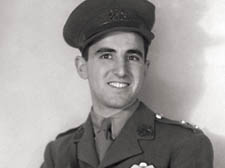|
|
 |
| |

Walter’s sheer audacity enabled him to fool his German enemies |
A Freud who dined behind enemy lines
Perhaps the most astonishing tale about the famous Viennese refugee family is that about Sigmund’s grandson – who persuaded the Germans to surrender an airfield, writes Gerald Isaaman
Freuds’ War. By Helen Fry.
The History Press
WE'VE all heard of Sigmund Freud, the father of modern psychology, who escaped from Nazi-occupied Vienna to spend his final days in Maresfield Gardens, Hampstead, where his admired daughter, Anna, pioneered his work with children.
And we know something about Clement Freud, the MP, wit and broadcaster, Lucian Freud, the eminent artist, and Freud offspring Emma and Matthew. But who was Walter?
As you might expect, anyone who bears the name of Freud might well be expected to be exceptional. And certainly Walter Freud, who, like his grandfather Sigmund, escaped the Nazis in Austria, followed remarkably in the same courageous vein.
Walter, who died five years ago, was a war hero whose story as an Special Operations Executive (SOE) spy is only now told in dramatic detail by Helen Fry, thanks to the sole access she has had to Walter’s unpublished diaries and the family papers of his father, Martin.
It is a story sympathetically told with the considerable help of Michael Molnar, director of the Freud Museum that now occupies Sigmund’s old home, and it reads like the script of a Hollywood movie set in the dying days of World War II.
Moreover, Fry has dug it out of files and papers that Walter’s three surviving children poured into the boot of her car after she initially contacted them.
The information has enabled her to produce an intimate, graphic and detailed picture of Sigmund Freud, the family man whose books were burned across Germany, and the last minute escape of the family to London in March, 1938.
Other members of the Freud family were not so fortunate – three of Freud’s sisters were murdered in Auschwitz and Treblinka, and another sister, Dolfi, succumbed to starvation in a concentration camp.
When war came the following year, Martin and Walter, along with thousands of German expatriates, were both interned as enemy aliens.
“We were driven out of Austria like mangy dogs and considered ourselves lucky to escape alive,” records Walter.
Partly for that reason, Walter wanted to play his part in defying Hitler. He volunteered for the SOE and after training as a radio operator, was sent off to Italy for a mission with other expatriate Austrians, to capture an airport as American and Russian troops closed in on the Germans in April, 1945. It was a mission too far.
Walter was dropped into the pitch black night at the wrong spot, from the wrong height and landed alone by parachute without his equipment, lost in a landscape and unable to contact his colleagues.
“I wondered what sort of reception I would get,” he recalled. “Would the population receive us with open arms, as liberators, or would they lynch us at the first opportunity?”
With his brave audacity and imagination, he needn’t have worried because he knew how to fool the enemy.
Walter simply walked into a German camp, asked to speak to the commanding officer, to whom he explained he was a British officer specially sent by General Montgomery, whose nearby army was about to attack.
He asked him to surrender the airport at Zeltweg to the British.
The Germans, who feared the Russians, then 60 miles away, more than even the SS, eventually agreed. But not before Walter had endured being driven through occupied territory in a fire engine with siren blaring; heel-clicking German officers jumping to attention when they invited him to dine; being fired on by a Russian fighter plane as he went to see a German general for a final decision; and being quizzed about his ability to speak such excellent German.
Worst of all, one by one the German officers, fearful of future war crime trials, took him aside and told him how they had tried to protect Jewish friends from the Holocaust, not knowing that he too was Jewish and a victim.
“Those evil henchmen, who for 12 years had done everything in their power to humiliate, harass and eventually kill their Jewish co-patriots, were then coming crawling to me and sold their Nazi convictions and anti-semitic beliefs for a few semi- reassuring words,” Walter would go on to write.
It is a sensational story, a true and touching tribute to an unknown Freud, a real patriot who deserves our belated applause and admiration.
?
|
 |
|
 |
 |
|
 |
|


